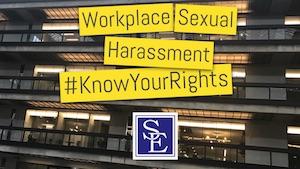OF DISCRIMINATION AND HARASSMENT
What is Unlawful Workplace Sexual Harassment?

Sexually harassing conduct is unlawful when it is severe and pervasive enough to make a reasonable woman or man believe that conditions of employment have been altered and that the work environment has become hostile. Whether the sexual harassment is severe or pervasive enough to meet this legal standard is fact-specific to all the circumstances of the sexual harassment and the work environment. Some court cases interpreting New Jersey sexual harassment law have stated that one comment or other incident of sexual harassment can be enough to support a claim of sexual harassment if it is severe enough to alter the work conditions of the employee.
Sexual harassment comes in many different forms. It can be verbal or non-verbal. It can be subtle or overt. It can include physical touching. Examples of sexual harassment include any of the following:
- Unwelcomed sexual contact;
- Unwanted sexual advances;
- Leering or ogling;
- Sexual propositioning;
- Display of sexually offensive materials;
- Belittling remarks to a class of persons;
- Comments or jokes of sexual nature;
- Comments about an individual’s body;
- Berating statements to a class of persons;
Not all personally offensive conduct at the workplace is actionable sexual harassment. New Jersey sexual harassment laws have both an objective and subjective test to determine whether the sexually harassing conduct is actionable under the law. For example, the sexual harassment must be unwelcomed by the person who is being sexually harassed. Moreover, the sexual harassment conduct must be severe or pervasive enough for a reasonable woman or man to believe the conditions of employment have been altered and the work environment become hostile.
Employers should promptly, thorough and completely investigate all good faith and reasonable complaints of sexual harassment. An investigation can be done by an employee of the employer or by an outside investigator such as a lawyer or human resource consultant. Appropriate disciplinary action should be taken against any employee or other person affiliated with the employer and such disciplinary action must stop the sexually harassing conduct from ever occurring again. This can include termination of the perpetrator or other action that will prevent any further sexual harassment. Employers are also strictly prohibited from taking adverse employment action against any person who makes a good faith complaint of sexual harassment or persons who participate in any complaint investigation.
Employers who permit employees to work in a hostile work environment can be held responsible for the sexual harassment. Employers must have effective anti-discrimination policies in place, that includes promptly, thorough and completely investigating all good faith complaints of sexual harassment. The investigation must stop the sexual harassment immediately and prevent any further sexual harassment from occurring in the future.
Whether an incident or series of incidents constitutes unlawful sexual harassment is dependent on many actors. It is always advisable for an employee who believes he or she may be the victim of sexual harassment to immediately contact an employment lawyer who can analyze the relevant facts and provide advice and counsel concerning their legal options and obligations in an employer’s investigation of any complaint.





